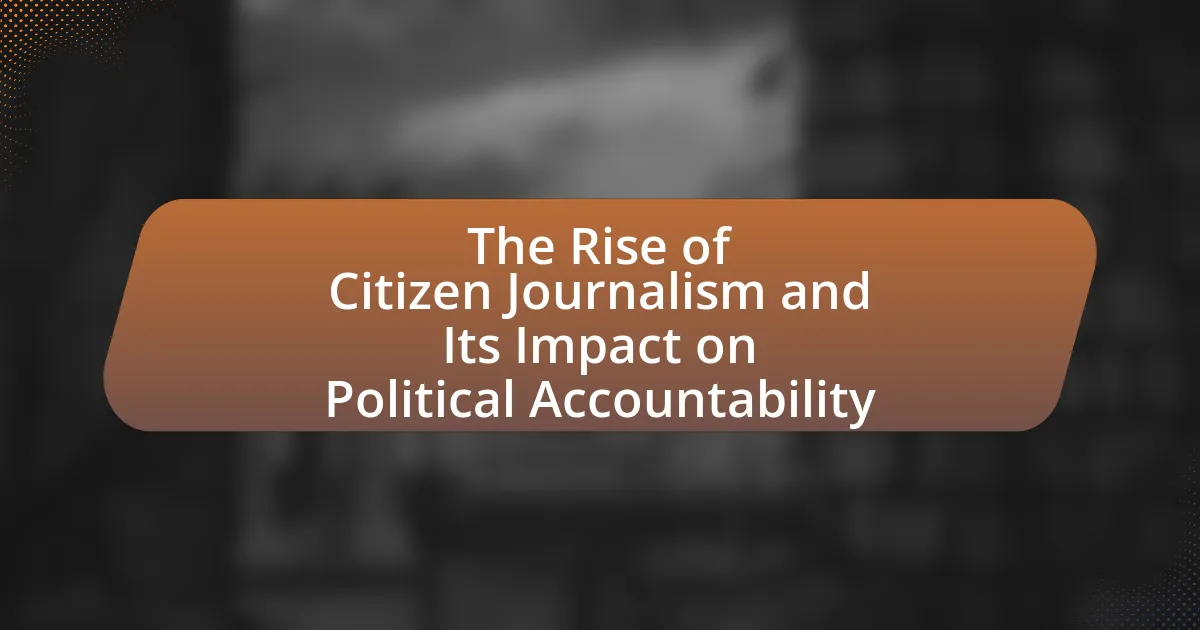Citizen journalism is the practice where individuals, often without formal training, report news and share information primarily through social media platforms. This trend is rising due to the accessibility of technology, enabling ordinary people to document events in real-time and contribute to political accountability by amplifying marginalized voices. The article explores how advancements in technology, particularly smartphones and social media, have facilitated citizen journalism, its key characteristics, and the ethical considerations involved. It also examines the impact of citizen journalism on political transparency and accountability, highlighting challenges such as misinformation and legal risks, while discussing future trends and best practices for effective reporting.

What is Citizen Journalism and Why is it Rising?
Citizen journalism is the practice where individuals, often without formal training, report news and share information through various platforms, particularly social media. This phenomenon is rising due to the increasing accessibility of technology, such as smartphones and the internet, which empower ordinary people to document events in real-time and disseminate information widely. According to a 2021 Pew Research Center study, 53% of Americans reported getting news from social media, highlighting the shift towards user-generated content as a significant source of information. This trend enhances political accountability by allowing marginalized voices to be heard and providing alternative perspectives on events that mainstream media may overlook.
How has technology influenced the rise of citizen journalism?
Technology has significantly influenced the rise of citizen journalism by providing accessible platforms and tools for individuals to report news and share information. The proliferation of smartphones equipped with high-quality cameras and internet connectivity allows ordinary people to capture and disseminate events in real-time, often faster than traditional media outlets. For instance, during the Arab Spring, social media platforms like Twitter and Facebook enabled citizens to document protests and government actions, leading to widespread global awareness and engagement. This shift has democratized information sharing, empowering individuals to hold authorities accountable and challenge mainstream narratives.
What role do social media platforms play in citizen journalism?
Social media platforms serve as critical tools for citizen journalism by enabling individuals to share news and information rapidly and widely. These platforms facilitate real-time reporting, allowing ordinary citizens to document events as they unfold, often filling gaps left by traditional media. For instance, during significant events like protests or natural disasters, social media users can broadcast live updates, images, and videos, which can reach a global audience instantly. This immediacy enhances the public’s access to diverse perspectives and information, contributing to a more informed citizenry. Research indicates that social media has become a primary source of news for many people, with a Pew Research Center study showing that 62% of U.S. adults get news from social media. This shift underscores the importance of social media in shaping public discourse and holding authorities accountable.
How do mobile devices facilitate citizen journalism?
Mobile devices facilitate citizen journalism by enabling individuals to capture, report, and disseminate news in real-time. These devices, equipped with cameras and internet access, allow citizens to document events as they happen, providing immediate coverage that traditional media may not be able to offer. For instance, during protests or natural disasters, mobile devices empower ordinary people to share firsthand accounts and images on social media platforms, reaching a global audience instantly. This immediacy enhances the diversity of perspectives in news reporting and holds authorities accountable, as seen in events like the Arab Spring, where citizen-generated content played a crucial role in informing the world and mobilizing support.
What are the key characteristics of citizen journalism?
Citizen journalism is characterized by its grassroots nature, where ordinary individuals report news and share information, often using digital platforms. This form of journalism emphasizes immediacy, as citizen journalists can quickly disseminate information through social media and blogs, bypassing traditional media gatekeepers. Additionally, citizen journalism fosters community engagement, allowing local voices to contribute to the narrative and hold authorities accountable. The rise of citizen journalism has been supported by the proliferation of smartphones and internet access, enabling widespread participation in news reporting. Studies indicate that citizen journalism can enhance political accountability by providing alternative perspectives and exposing issues that may be overlooked by mainstream media.
How does citizen journalism differ from traditional journalism?
Citizen journalism differs from traditional journalism primarily in its source and method of content creation. Citizen journalism is conducted by non-professionals who report news and events, often using digital platforms, while traditional journalism is carried out by trained professionals adhering to established editorial standards and practices. For instance, citizen journalists often utilize social media to share firsthand accounts and images, which can lead to rapid dissemination of information, whereas traditional journalists typically follow a more structured process involving research, fact-checking, and editorial oversight. This distinction highlights the democratization of news reporting through citizen journalism, which has gained prominence with the rise of the internet and mobile technology, allowing ordinary individuals to contribute to public discourse and hold power accountable.
What ethical considerations are involved in citizen journalism?
Ethical considerations in citizen journalism include accuracy, accountability, and the potential for harm. Citizen journalists often lack formal training, which can lead to the dissemination of misinformation; for instance, a study by the Pew Research Center found that 64% of Americans believe that social media platforms contribute to the spread of false information. Additionally, citizen journalists must navigate issues of privacy and consent, particularly when reporting on sensitive subjects, as failing to do so can result in harm to individuals involved. Furthermore, the lack of editorial oversight raises questions about accountability, as there may be no established mechanism for addressing inaccuracies or ethical breaches. These factors highlight the complex ethical landscape that citizen journalism operates within, impacting its credibility and societal implications.

How Does Citizen Journalism Impact Political Accountability?
Citizen journalism significantly enhances political accountability by providing a platform for ordinary individuals to report on government actions and societal issues. This grassroots reporting often uncovers corruption, misconduct, and inefficiencies that traditional media may overlook or underreport. For instance, during the Arab Spring, citizen journalists played a crucial role in documenting protests and government responses, which led to increased international scrutiny and pressure on regimes. Furthermore, studies indicate that citizen journalism can lead to greater public engagement and awareness, as seen in various social media campaigns that mobilized citizens to demand transparency and accountability from their leaders.
In what ways does citizen journalism enhance political transparency?
Citizen journalism enhances political transparency by providing an alternative platform for information dissemination, allowing citizens to report on political events and issues directly. This grassroots reporting often uncovers information that mainstream media may overlook or censor, thereby increasing the availability of diverse perspectives on political matters. For instance, during the Arab Spring, citizen journalists used social media to document protests and government responses, which played a crucial role in informing the global audience and holding authorities accountable. Additionally, citizen journalism fosters community engagement and encourages public discourse, as individuals share their insights and experiences, contributing to a more informed electorate. This participatory approach not only democratizes information but also pressures political entities to act transparently, knowing that their actions are subject to public scrutiny.
How do citizen journalists expose corruption and misconduct?
Citizen journalists expose corruption and misconduct by leveraging digital platforms to report and disseminate information that traditional media may overlook. They often gather evidence through firsthand accounts, photographs, and videos, which can be shared widely on social media, increasing visibility and public awareness. For instance, during the Arab Spring, citizen journalists played a crucial role in documenting government abuses and mobilizing protests, leading to significant political changes in several countries. Their ability to bypass traditional gatekeepers allows for a more immediate and unfiltered presentation of events, thereby holding authorities accountable.
What examples illustrate the impact of citizen journalism on political events?
Citizen journalism has significantly impacted political events, notably during the Arab Spring, where social media platforms enabled citizens to document protests and government responses in real-time. For instance, in Tunisia, citizen journalists shared videos and reports that galvanized international attention and support, ultimately contributing to the ousting of President Zine El Abidine Ben Ali in 2011. Additionally, during the Black Lives Matter movement, citizen journalists captured instances of police brutality, which led to widespread public outcry and policy discussions on police reform. These examples demonstrate how citizen journalism can influence political discourse and accountability by providing unfiltered narratives that challenge official narratives.
What challenges does citizen journalism face in promoting accountability?
Citizen journalism faces significant challenges in promoting accountability, primarily due to issues of credibility, lack of resources, and legal risks. Credibility is a major concern, as citizen journalists often lack formal training and may not adhere to established journalistic standards, leading to misinformation. A study by the Pew Research Center in 2021 highlighted that 64% of Americans believe that social media platforms contribute to the spread of false information, undermining the reliability of citizen-generated content.
Additionally, citizen journalists frequently operate without the financial backing or institutional support that traditional media organizations possess, limiting their ability to conduct thorough investigations. This resource gap can hinder their effectiveness in holding powerful entities accountable. Furthermore, legal risks, including threats of lawsuits or harassment, can deter citizen journalists from reporting on sensitive issues, as noted in a report by the Committee to Protect Journalists, which documented over 200 incidents of violence against journalists in 2020 alone.
These challenges collectively impede the ability of citizen journalism to effectively promote accountability in political contexts.
How do misinformation and fake news affect citizen journalism’s credibility?
Misinformation and fake news significantly undermine citizen journalism’s credibility by eroding public trust in the information provided by non-professional journalists. When citizen journalists disseminate inaccurate or misleading information, it creates skepticism among audiences regarding the reliability of their reports. A study by the Pew Research Center found that 64% of Americans believe that fabricated news stories cause confusion about basic facts, which directly impacts the perceived legitimacy of citizen journalism. As a result, the proliferation of false information can lead to a general distrust of all citizen-generated content, making it challenging for credible citizen journalists to establish their authority and influence in the media landscape.
What legal issues confront citizen journalists in their work?
Citizen journalists face several legal issues, including defamation, copyright infringement, and privacy violations. Defamation occurs when false information is published that harms an individual’s reputation, which can lead to lawsuits. Copyright infringement arises when citizen journalists use protected content without permission, risking legal action from original creators. Privacy violations can occur when citizen journalists disclose private information without consent, potentially leading to legal repercussions. These legal challenges highlight the need for citizen journalists to understand media law to navigate their reporting responsibly and avoid litigation.

What Future Trends Can We Expect in Citizen Journalism?
Future trends in citizen journalism include increased use of technology, greater collaboration with traditional media, and a focus on local issues. The proliferation of smartphones and social media platforms enables citizen journalists to report news instantly, enhancing real-time coverage. Additionally, partnerships between citizen journalists and established news organizations are likely to grow, as traditional media seeks to leverage grassroots reporting for authenticity and local insights. Research indicates that local news coverage is becoming more critical, with 70% of Americans believing local journalism is essential for democracy, highlighting the importance of citizen contributions in this area.
How might advancements in technology shape the future of citizen journalism?
Advancements in technology will significantly shape the future of citizen journalism by enhancing accessibility, immediacy, and the ability to disseminate information widely. With the proliferation of smartphones and social media platforms, individuals can now capture and share news events in real-time, leading to a more democratized flow of information. For instance, during the Arab Spring, citizen journalists used mobile devices to report on protests, which garnered global attention and influenced political discourse. Furthermore, advancements in artificial intelligence and data analytics will enable citizen journalists to analyze large datasets, uncover trends, and provide deeper insights into political issues, thereby increasing their impact on political accountability.
What emerging tools are enhancing citizen journalists’ capabilities?
Emerging tools enhancing citizen journalists’ capabilities include mobile reporting apps, social media platforms, and data visualization software. Mobile reporting apps like Reporter and Storyful enable real-time news gathering and dissemination, allowing citizen journalists to capture and share events as they unfold. Social media platforms such as Twitter and Facebook facilitate rapid information sharing and audience engagement, empowering citizen journalists to reach wider audiences instantly. Data visualization software like Tableau and Infogram helps citizen journalists present complex information in an accessible format, enhancing storytelling and audience understanding. These tools collectively improve the efficiency, reach, and impact of citizen journalism, contributing to greater political accountability.
How could artificial intelligence influence citizen journalism practices?
Artificial intelligence could significantly enhance citizen journalism practices by automating content curation, improving fact-checking, and enabling real-time data analysis. AI algorithms can sift through vast amounts of information, identifying relevant news stories and trends that citizen journalists may otherwise overlook. For instance, tools like natural language processing can assist in verifying facts by cross-referencing claims with established databases, thereby increasing the credibility of citizen-generated content. Additionally, AI-driven analytics can provide insights into audience engagement, helping citizen journalists tailor their reporting to better meet community needs. This integration of AI not only streamlines the journalistic process but also empowers citizens to produce more accurate and impactful journalism, ultimately fostering greater political accountability.
What best practices should citizen journalists adopt for effective reporting?
Citizen journalists should adopt best practices such as verifying information, maintaining objectivity, and adhering to ethical standards for effective reporting. Verifying information involves cross-checking facts with reliable sources to ensure accuracy, which is crucial in preventing the spread of misinformation. Maintaining objectivity requires citizen journalists to present multiple viewpoints and avoid personal biases, thereby fostering trust among their audience. Adhering to ethical standards includes respecting privacy, obtaining consent when necessary, and being transparent about their methods and motivations. These practices enhance the credibility of citizen journalism, which plays a significant role in promoting political accountability by providing diverse perspectives and holding power to account.
How can citizen journalists ensure accuracy and reliability in their work?
Citizen journalists can ensure accuracy and reliability in their work by verifying information through multiple credible sources before publication. This practice is essential because it helps to confirm the authenticity of the facts being reported. For instance, a study by the Pew Research Center found that 64% of Americans believe that news organizations should verify information before reporting it, highlighting the public’s expectation for accuracy. Additionally, citizen journalists should utilize fact-checking tools and platforms, such as Snopes or FactCheck.org, to cross-reference claims and data. Engaging with experts in relevant fields can also enhance the credibility of their reports, as expert opinions provide authoritative insights that support the information presented.
What strategies can citizen journalists use to engage their audience effectively?
Citizen journalists can engage their audience effectively by utilizing social media platforms to share real-time updates and foster community interaction. By leveraging platforms like Twitter and Facebook, citizen journalists can disseminate information quickly, allowing for immediate feedback and dialogue with their audience. Research indicates that 64% of adults in the U.S. use social media to stay informed about current events, highlighting the importance of these platforms in reaching a broad audience. Additionally, incorporating multimedia elements such as videos and infographics can enhance storytelling and make content more relatable, as studies show that visual content is processed 60,000 times faster than text. Engaging with the audience through comments and discussions further builds a sense of community and trust, which is crucial for maintaining audience interest and participation.
